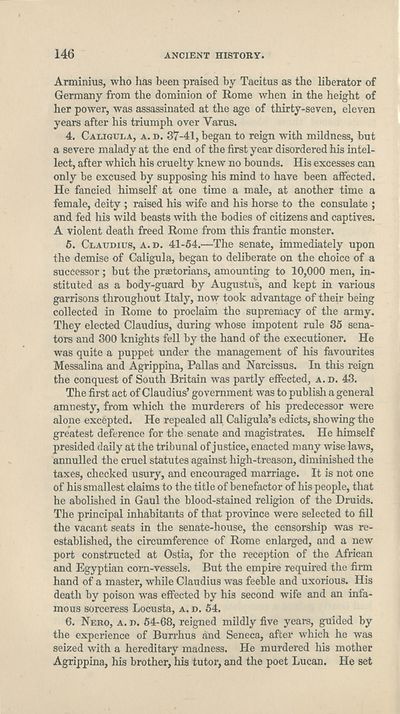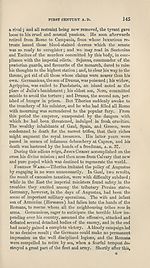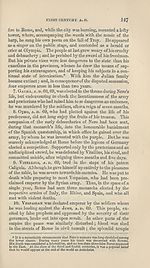Download files
Complete book:
Individual page:
Thumbnail gallery: Grid view | List view

146
ANCIENT HISTORY.
Arminius, who has been praised by Tacitus as the liberator of
Germany from the dominion of Rome when in the height of
her power, was assassinated at the age of thirty-seven, eleven
years after his triumph over Varus.
4. Caligula, a. d. 37-41, began to reign with mildness, but
a severe malady at the end of the first year disordered his intel¬
lect, after which his cruelty knew no bounds. His excesses can
only be excused by supposing his mind to have been affected.
He fancied himself at one time a male, at another time a
female, deity ; raised his wife and his horse to the consulate ;
and fed his wild beasts with the bodies of citizens and captives.
A violent death freed Rome from this frantic monster.
5. Claudius, a. d. 41-54.—The senate, immediately upon
the demise of Caligula, began to deliberate on the choice of a
successor; but the praetorians, amounting to 10,000 men, in¬
stituted as a body-guard by Augustus, and kept in various
garrisons throughout Italy, now took advantage of their being
collected in Rome to proclaim the supremacy of the army.
They elected Claudius, during whose impotent rule 35 sena¬
tors and 300 knights fell by the hand of the executioner. He
was quite a puppet under the management of his favourites
Messalina and Agrippina, Pallas and Narcissus. In this reign
the conquest of South Britain was partly effected, a. d. 43.
The first act of Claudius’ government was to publish a general
amnesty, from which the murderers of his predecessor were
alone excepted. He repealed all Caligula’s edicts, showing the
greatest deference for the senate and magistrates. He himself
presided daily at the tribunal of justice, enacted many wise laws,
annulled the cruel statutes against high-treason, diminished the
taxes, checked usury, and encouraged marriage. It is not one
of his smallest claims to the title of benefactor of his people, that
he abolished in Gaul the blood-stained religion of the Druids.
The principal inhabitants of that province were selected to fill
the vacant seats in the senate-house, the censorship was re¬
established, the circumference of Rome enlarged, and a new
port constructed at Ostia, for the reception of the African
and Egyptian corn-vessels. But the empire required the firm
hand of a master, while Claudius was feeble and uxorious. His
death by poison was effected by his second wife and an infa¬
mous sorceress Locusta, a. d. 54.
6. Nero, a. i>. 54-68, reigned mildly five years, guided by
the experience of Burrhus and Seneca, after which he was
seized with a hereditary madness. He murdered his mother
Agrippina, his brother, his tutor, and the poet Lucan. He set
ANCIENT HISTORY.
Arminius, who has been praised by Tacitus as the liberator of
Germany from the dominion of Rome when in the height of
her power, was assassinated at the age of thirty-seven, eleven
years after his triumph over Varus.
4. Caligula, a. d. 37-41, began to reign with mildness, but
a severe malady at the end of the first year disordered his intel¬
lect, after which his cruelty knew no bounds. His excesses can
only be excused by supposing his mind to have been affected.
He fancied himself at one time a male, at another time a
female, deity ; raised his wife and his horse to the consulate ;
and fed his wild beasts with the bodies of citizens and captives.
A violent death freed Rome from this frantic monster.
5. Claudius, a. d. 41-54.—The senate, immediately upon
the demise of Caligula, began to deliberate on the choice of a
successor; but the praetorians, amounting to 10,000 men, in¬
stituted as a body-guard by Augustus, and kept in various
garrisons throughout Italy, now took advantage of their being
collected in Rome to proclaim the supremacy of the army.
They elected Claudius, during whose impotent rule 35 sena¬
tors and 300 knights fell by the hand of the executioner. He
was quite a puppet under the management of his favourites
Messalina and Agrippina, Pallas and Narcissus. In this reign
the conquest of South Britain was partly effected, a. d. 43.
The first act of Claudius’ government was to publish a general
amnesty, from which the murderers of his predecessor were
alone excepted. He repealed all Caligula’s edicts, showing the
greatest deference for the senate and magistrates. He himself
presided daily at the tribunal of justice, enacted many wise laws,
annulled the cruel statutes against high-treason, diminished the
taxes, checked usury, and encouraged marriage. It is not one
of his smallest claims to the title of benefactor of his people, that
he abolished in Gaul the blood-stained religion of the Druids.
The principal inhabitants of that province were selected to fill
the vacant seats in the senate-house, the censorship was re¬
established, the circumference of Rome enlarged, and a new
port constructed at Ostia, for the reception of the African
and Egyptian corn-vessels. But the empire required the firm
hand of a master, while Claudius was feeble and uxorious. His
death by poison was effected by his second wife and an infa¬
mous sorceress Locusta, a. d. 54.
6. Nero, a. i>. 54-68, reigned mildly five years, guided by
the experience of Burrhus and Seneca, after which he was
seized with a hereditary madness. He murdered his mother
Agrippina, his brother, his tutor, and the poet Lucan. He set
Set display mode to:
![]() Universal Viewer |
Universal Viewer | ![]() Mirador |
Large image | Transcription
Mirador |
Large image | Transcription
| Antiquarian books of Scotland > Education > Elements of universal history on a new and systematic plan > (166) |
|---|
| Permanent URL | https://digital.nls.uk/127582132 |
|---|
| Description | Thousands of printed books from the Antiquarian Books of Scotland collection which dates from 1641 to the 1980s. The collection consists of 14,800 books which were published in Scotland or have a Scottish connection, e.g. through the author, printer or owner. Subjects covered include sport, education, diseases, adventure, occupations, Jacobites, politics and religion. Among the 29 languages represented are English, Gaelic, Italian, French, Russian and Swedish. |
|---|

